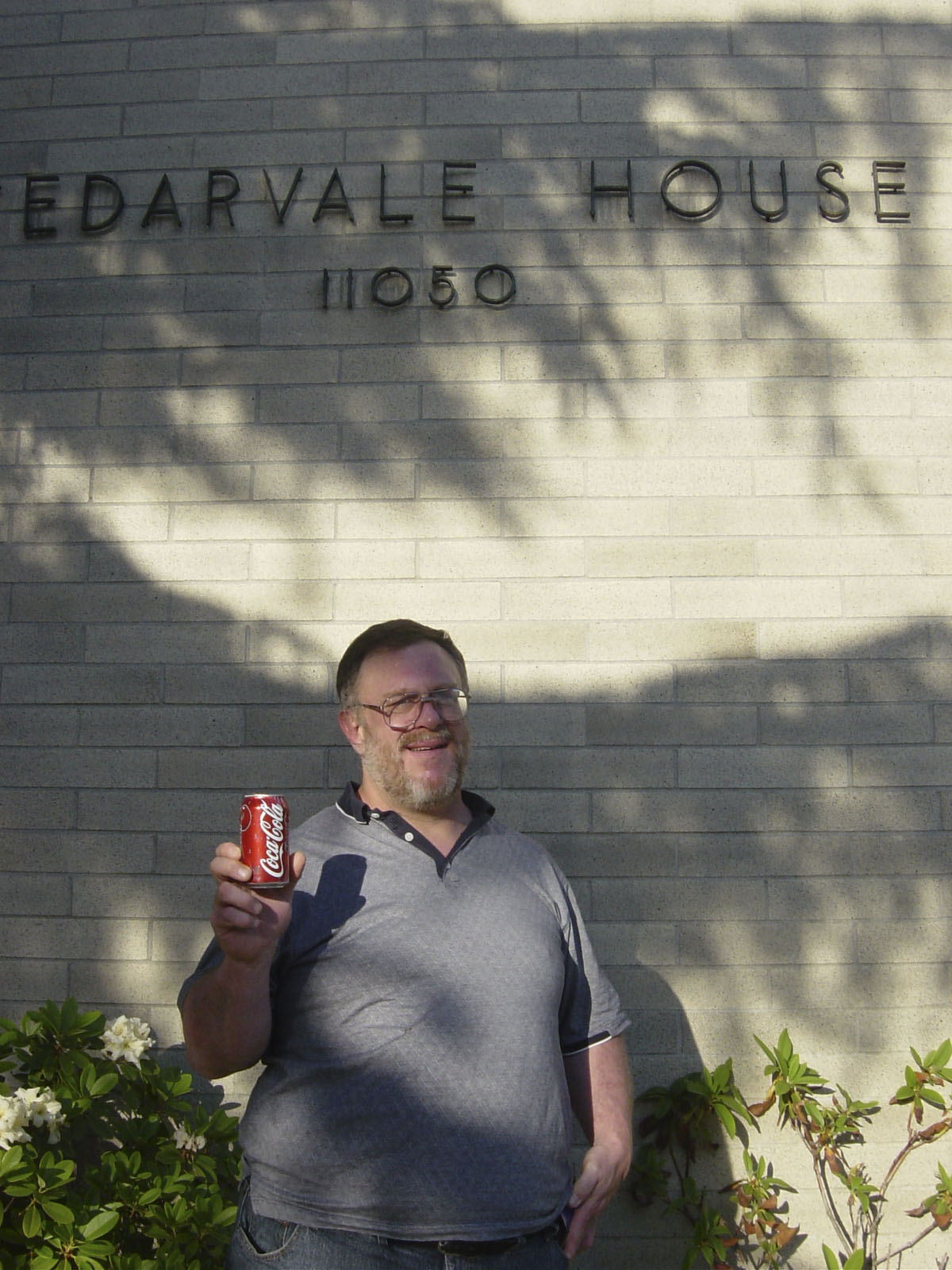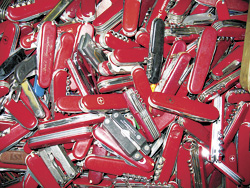Rick Harrison’s career as a vending-machine detective began the day he moved into Cedarvale House, a Seattle Housing Authority apartment building in Northgate. Harrison was touring his building in August of 2004 when he stopped cold: His eye was caught by a packet of Ruger wafers in the game room’s snack machine.
“I don’t know if you’ve ever seen those. They’re in a foil pack,” says Harrison, a 47-year-old paralegal student at Edmonds Community College. “They’re your basic wafer/chocolate cookie, but they’re good. So I was going, ‘Cool, man.'”
Over the next couple of years, Harrison kept tabs on the machine, as well as its three soda-dispensing sisters. Though the fatty treats might not have been good for his body, it turned out they came enriched with an ort of social justice. In 2002, SHA ordered that all profits from vending machines in its buildings were to be split between the vending contractor and the residents themselves. As the newly minted treasurer of Cedarvale’s resident council, Harrison watched meager amounts of lucre trickle in from his building’s machines. At roughly 25 cents to the dollar, the take averaged $110 each quarter from 2004 into the second half of 2005, enough for Cedarvale to stage summer barbecues and holiday parties.
Harrison grew alarmed, however, as the snack cash plummeted to $16.64 during 2005’s fall quarter. It remained low that winter at $25.29 and into the spring at $34.39, before climbing up to $75.81 for the 2006 summer quarter. Communicating his confusion to other tenant leaders in SHA properties citywide, he says he heard of similar drops in snack revenue during that period. With only $78 in the bank at the end of the year, Cedarvale canceled its turkey-and-mashed-potato Christmas dinner in lieu of a cheerless “punch-and-cookies kind of thing,” says Harrison.
“A lot of people here don’t have any family, so it’s the only Christmas dinner they have unless they go to the mission or somewhere,” he says. Harrison describes the vibe at last year’s dinner as despondent—or at least more so than usual. “Even if you have prime rib, half the people will sit around depressed because they have serious depression problems. . . . But there was a general disappointment because it had been a tradition for years.”
Harrison felt screwed. It wasn’t the first time: His initial application for public housing was denied in 2001 by the SHA because he didn’t attach a form correctly. At the time, he was recovering from two broken ankles he sustained as a printing-equipment serviceman. He managed to force the agency to accept his application by citing HUD rules in an SHA hearing, but by then somebody else had taken his apartment, leaving him homeless and bitter. “I spent the whole summer of 2001 walking the fucking streets with a cast—one of those rubber strap-on casts—because these bastards misinterpreted a fucking HUD rule like that? Fuck you, OK?”
The dip in vending revenue smelled like more SHA high jinks. “I think that the vendor has been underreporting,” he says. “It’s just part of a bigger problem. It’s an agency that’s out of control.”
Harrison wanted some answers, so he filed a series of public-disclosure requests, and received an accounting of sales from the city’s vendor, Everett-based Summit Vending, that he felt revealed impossible figures. Harrison showed the figures to an accountant with the Northwest Justice Project, and the CPA “agreed there was something stinky here,” says Harrison, himself a Justice Project board member.
From there, Harrison called Coca-Cola and Pepsi. He traveled to a nearby vending company and questioned a salesman about the workings of snack machines. He even accosted a Summit stockman in his own building, interrogating him into a surly silence. A manager at Summit hung up on him when he called the headquarters, says Harrison, but through the SHA he learned that the vending company was asking for up-front payment before it would consider redoing its figures. “They were looking at a week’s worth of work at $30 bucks or some ridiculous amount per hour,” Harrison says.
But when Summit signed a contract with the SHA in 2002, it agreed that it would release such information for free. “Under the contract that I looked at, there wasn’t any requirement that they had to pay to audit. That’s ridiculous,” says Julie Wade, a pro bono attorney from Starbucks who was SHA’s general counsel from 1990 until 2000. Earlier, Wade had helped Harrison get a month’s free rent from the agency for substandard living conditions in a building on Capitol Hill, and she says she finds Harrison’s claims of bad numbers “very plausible.”
“The last people we’d rip off is SHA,” says Nickolas Streeter, vice president of Summit. He notes thatSummit’s payments to Cedarvale have fluctuated in the past four years; expecting level sales figures, he says, is misguided. “Somebody’s creating a furor without much validity.”
As he waits for new figures, Harrison has latched onto a proven malfeasance: “phantom” vending machines. The SHA, following up on Harrison’s prodding for a complete inventory, discovered several vending machines it wasn’t aware of but that Summit had been profiting from. One of these machines is in Harrison’s building. “Summit has no credible way to say ‘oops,'” he says. “Not for four years of unlisted machines.”
“We completed an internal audit in November and identified eight machines that had not been documented,” says Andrew Lofton, SHA’s deputy executive director of finance and administration. “The proceeds of these machines for the resident councils totaled $625.25. We disbursed this in December 2006 or January 2007.”
Harrison, though, calculates that the company owes SHA roughly $11,000, which he says includes the alleged underreporting of past years and a handful of other unlisted machines. Some evenings, after his work-study job as a classroom projector maintenance man ends, Harrison climbs into his ’95 Honda Civic and drives to different SHA properties around the city. Outside a given building, he typically cools his heels until he can convince a tenant to let him in so he can take pictures of vending machines.
“Sometime you’re sitting out there for an hour, and you get a bunch of people saying, ‘No.’ And after one person says, ‘No,’ it’s actually more likely that the others will say, ‘Who is this guy out here?'” he says. At the Ballard House, somebody called the cops on Harrison as he cased the joint, but he wasn’t arrested.
Harrison’s detective work has confirmed an SHA/Summit miscount; he says he might use his photographic evidence in a pro-se lawsuit against the SHA. The agency apparently is challenging him to bring it on. “From our perspective, there’s nothing more that we can do,” says Lofton.
Harrison’s document pile grows by the day. A couple of weeks ago, while he was moving furniture to make room for SHA repairmen, he knocked a shelf containing about 25,000 loose papers onto his floor. “It’s document tossed salad,” he says. “I’m going through and resorting them, and I’m cursing [SHA] the whole time.
“It would be much easier if they didn’t [agree to share the profits] in the first place,” he says, “because then we wouldn’t have the expectation.”







